Yesterday, a Mozzer shared this video with the company over an allstaff thread. I started watching, as I usually do, thinking that 1-2 minutes into the video I’d give up and get back to my email. Wrong. For 19 minutes and 5 seconds, I was captivated. The video isn’t lovely or beautifully done, but it is fascinating, and it told a story with which I was unfamiliar (about a game designer named Phil Fish) with lessons remarkably applicable to the world of marketing.
If you’re A) in marketing, B) curious about the nature of fame, and/or C) fascinated how the web amplifies and changes human behavior, you should watch it.
These are 5 of the big concepts that stuck with me after viewing:
#1) “The more compressed information is, the further it can travel on the web.”
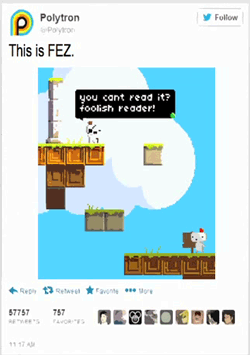
I’ve never played Fez (nor heard of its creator), but I had seen some screenshots and a short animation from it a few years ago. Reflecting back, it’s clear that my brief exposure to the game was due almost entirely to what the video describes – the game compresses well. This is why “great content” often does poorly alongside “mediocre content in an easy-to-process, highly shareable format.” It probably has something to do with my surprise, earlier this week, when this tweet I sent on a lark, became my most retweeted message ever.
#2) Disproving the underpinnings of why we’ve formed an opinion only bolsters those opinions.
This might be one of the saddest parts of human psychology – that once we have an opinion about someone/something/some political idea, we are so reluctant to give it up that disproving our core beliefs about that topic will only make us more likely to support it. In the video, the narrator notes that one of the central criticisms of the game creator is that he hadn’t previously released a game.
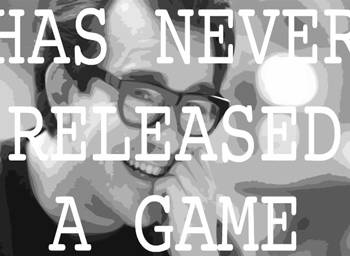
At the end of the video, this is proven false (and apparently that knowledge, which has long been available, did nothing to deter criticism). Interestingly, if the recent research into false beliefs is accurate, this data point will not change the minds of those who hold negative opinions of the film’s subject any more than evidence proving climate change or evidence proving the safety of vaccines changes the minds of those who hold these wrong opinions. In fact, it will make those people belive more strongly that they are right.
As the researcher, Brendan Nyhan, puts it “our prior beliefs, commitments, and emotions drive our responses to new information, such that when we are faced with facts that deeply challenge these commitments, we fight back against them to defend our identities.” To me, this is sad, sobering, but useful information.
#3) Celebrities, bands, companies, and products are judged not based on their inherent qualities but on all the associations people form around them.
This has been a critical learning for me over the years. Subscribers to a software product don’t evangelize or denounce the software based solely on its merits. There’s an entire ecosystem of connections and context that go with those attitudes.
In the video, the narrator makes this point well using the band Nickelback.
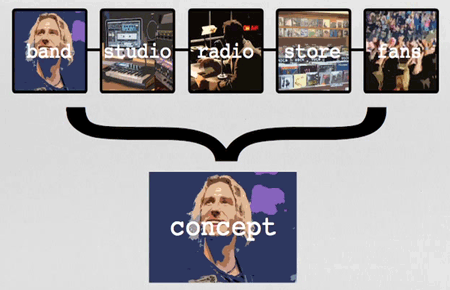
I’ve probably heard their music, but can’t recall any of their songs nor could I place them if asked. But, I have long wondered why this particular group was the butt of so many jokes. The connections and context being criticized through invoking “Nickelback” (the concept) helped make that much more clear.
A couple years ago, we put together a wordcloud of all the messages people had sent us when cancelling a subscription to Moz’s software. The most commonly used word by far was “love” (as in “love you guys, but…” or “love Moz, just couldn’t…”). It drove me crazy to think the people who really liked the company were abandoning the product when in fact, I shouldn’t have been surprised. People don’t generally subscribe to products from companies they hate (other than Comcast), and positive associations/feelings toward the company may actually have swayed many “not-right” customers into signing up in the first place.
#4) Media, both user-generated and editorially controlled, is far more likely to write/amplify something that reinforces an existing perception of someone/something well-known rather than something that refutes those perceptions or adds complexity.
It’s no surprise that we humans like our villains evil and our heroes good. Complexity doesn’t compress well – there’s no tl;dr headline or simple one-glance-graphic that can rapidly spread across the web. So when a well-known figure (or, in this case, well-known-in-a-niche figure) makes statements that fit with the common preconceptions about them, those statements are amplified and become newsworthy. When that same figure makes statements that add complexity, nuance, or contradiction to
As the video eloquently puts it, “he’s newsworthy when he acts like a symbol. Anything that doesn’t fit the narrative is ignored…”
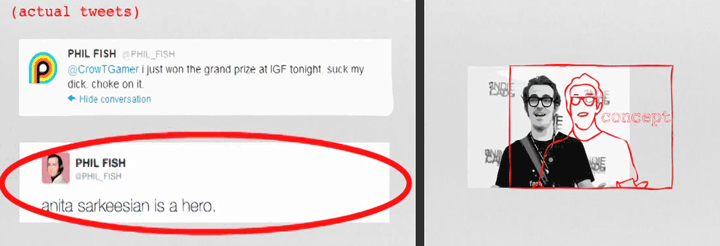
This is incredibly important for marketers, startups, and entrepreneurs. If you (or your product) have been defined in a certain way by the press, your fans, or a niche community, your best shot at earning additional attention is to leverage the associations you have rather than trying to create a nuanced, complex portrayal. Of course, much of the time, this may come at the cost of accuracy and holistic transparency.
#5) Internet hatred is amplified dramatically for social minorities. Internet love, sadly, is not.
The video makes mention of Anita Sarkeesian, a woman in the games journalism field who receives constant violence, rape, and death threats (the article Dear Internet, This is Why You Can’t Have Anything Nice has an excellent rundown on details). Later, it’s more specific about how web hatred is deployed and who receives unfair shares.
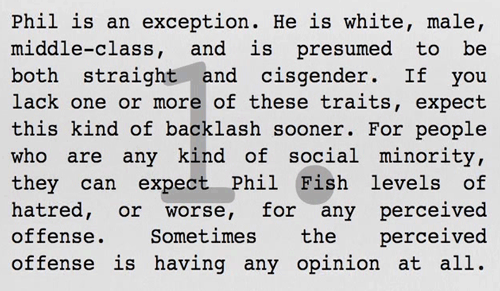
It’s a reminder to me to feel thankful and lucky for all the shit I don’t have to put up with due to complete luck of birth circumstance (I’m Jewish by ethnicity, but have never had it come up online). And, it’s a reminder to have empathy for and a desire to help all those who don’t fit this pattern and thus, have to find ways around the many subtle and not-so-subtle biases.
All in all, this was one of the most worthwhile 19 minutes of video I’ve watched on the web recently. That the topic was so unexpectedly illuminating only made it more memorable and worth sharing.
